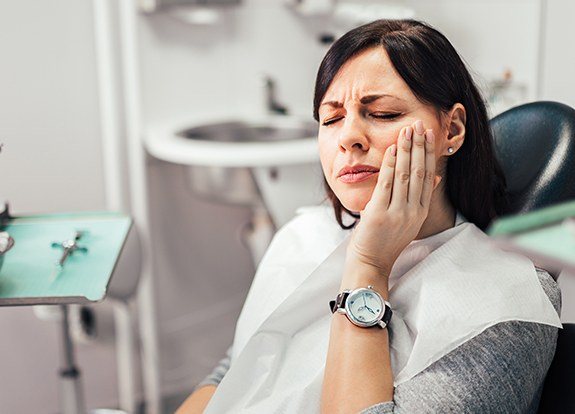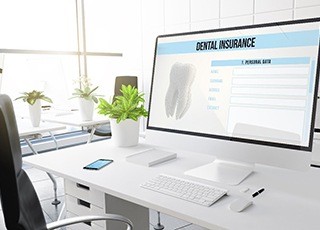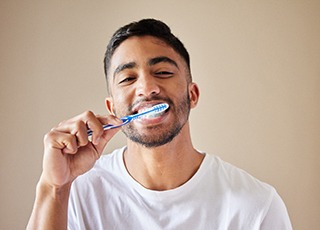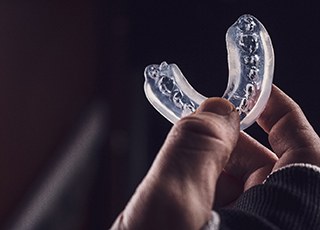Emergency Dentist — Grand Prairie, TX
Fast & Pain-Relieving Emergency Treatment
Our team understands that accidents happen, and sometimes, they concern the teeth. That’s why we welcome dental emergency walk-ins and always strive to be there whenever you need us most. We also offer nitrous oxide sedation to help you feel more comfortable while you’re receiving treatment. To schedule an emergency visit or get over-the-phone first-aid guidance in your time of need, contact our dental office today for emergency dentistry in Grand Prairie!

Why Choose Care 32 Dental of Grand Prairie for Emergency Dentistry?
- Nitrous Oxide Sedation Available
- In-Network with Nearly All PPO Plans
- Emergency Walk-Ins Always Welcome
What to Do in a Dental Emergency

- Call our office. The sooner you get in touch with our office, the more quickly we’ll get your smile back to normal. We’ll do our best to accommodate same-day emergency visits.
- See Dr. Desai for an emergency exam. When you get to our office, Dr. Desai will perform a detailed examination and take X-rays to identify the root cause of your problem. She’ll explain her findings to give you a clear understanding of what’s affecting your oral health.
- Get the care you need. Our team will work diligently to get your situation under control. Some common solutions for dental emergencies include fillings, crowns, root canal therapy, and extraction.
The Most Common Dental Emergencies
The first step you should always take in the midst of a dental emergency is call us to speak with one of our dental professionals. We’ll be able to provide you with tips to minimize any threat of additional oral damage until you’re able to get to our dental office for treatment. Below, we’ve also included some helpful advice to handle common dental emergencies as you’re getting ready to come to our dental office.
Understanding the Cost of Emergency Dentistry

The only way we’ll be able to determine the cost of your emergency treatment is by first taking X-rays and conducting a visual inspection of your mouth. Once we determine the underlying problem, we’ll develop a treatment plan to address it. Before we conduct any dental work, we’ll discuss the cost and your dental insurance coverage if applicable. Our team always maximizes dental insurance benefits to the best of our ability, and we also offer additional financing through CareCredit.
Why Every Dental Emergency is Different

As we mentioned in the first section, we need to take X-rays and conduct an oral exam when you arrive at our office. That way, we can pinpoint both the root of the problem and how severe the dental damage is. Only then can we review your treatment options and help you determine the next best steps for your oral health. For example, even if two patients come to our office with a large cavity, we may recommend a dental crown for one and root canal treatment for the next – it really depends on the patient’s specific dental needs!
Does Dental Insurance Cover Dental Emergencies?

Dental insurance providers typically do cover a portion of the cost of emergency dentistry. As always, you need to review the fine print on your plan to see if any waiting periods, annual deductibles, or yearly maximums will impact your coverage first. Since this is often easier said than done, you’re more than welcome to ask our Grand Prairie dental team for help too! We’re proud to welcome Cigna, Metlife, Humana, and several other popular providers, which makes utilizing any available benefits you have a breeze.
Other Options for Making Dental Emergencies Affordable

In addition to dental insurance and our in-house plan, our team at Care 32 Dental also welcomes flexible financing with CareCredit. As a result, you don’t have to worry about paying for the entire cost of emergency dental care upfront. Instead, you can choose one of their payment plans and breakdown the cost into manageable monthly chunks! They even offer options with little-to-no interest attached, which ensures that your treatment is affordable in the short and long-term.
Taking Care Of Your Smile Can Save You Money

Although accidents can’t be completely avoided, good dental care habits can go a long way when it comes to protecting your smile and, in turn, protecting your wallet. For that reason, we strongly recommend doing what you can to protect your teeth from harm. That starts with implementing a solid oral hygiene regimen and visiting us twice a year for a checkup and extends to wearing a mouthguard when playing sports and not smoking. As always, if you have any questions about how to protect your smile from harm, don’t hesitate to reach out to our friendly team for tips.
Keys to Preventing Dental Emergencies

Even though you can’t completely prevent all dental emergencies from occurring, there are some basic measures you can take to drastically reduce your risk of experiencing one. With this in mind, keep reading to learn a few healthy habits you should adopt to protect your teeth and gums from harm.
Visit Your Dentist Regularly

Tooth decay and gum disease can result in everything from a sharp, stabbing pain when you bite down to considerable dental sensitivity that negatively impacts your day-to-day life. The good news is that you can dramatically reduce your chances of developing oral health problems like these by visiting Dr. Desai every six months for checkups and cleanings. So, if it’s been more than six months since your last visit, schedule an appointment with us today!
Maintain Good Oral Hygiene At Home

A solid at-home oral hygiene routine is essential because it helps prevent plaque buildup and decay while also keeping your teeth white and your breath fresh. If your dental regimen is currently a bit lackluster, then there’s no better time to adopt better habits. A few examples include brushing twice a day, flossing each morning or evening, and rinsing with an antimicrobial mouthwash daily.
Stick to a Nutritious Diet

While crunchy foods can result in a considerable chip, sticky foods can pull a dental filling loose. That’s why we encourage our patients to be careful when eating caramel, raw nuts, popcorn, and the like. It’s also important that we mention here the importance of filling your plate with essential vitamins, minerals, and nutrients. That way, your body can fight infections while simultaneously keeping your jawbone strong and your teeth healthy.
Wear a Mouthguard

If you play sports, lift weights, or have a hobby like surfing or skateboarding, you need a mouthguard. That way, your teeth are protected from everything from chronic clenching to unforeseen accidents. We also recommend getting a custom mouthguard if you grind your teeth at night. This will help prevent cracks, fractures, and chips.
Use Tools to Open Packages, Not Your Teeth

Simply put, you should never use your teeth as tools. That means you shouldn’t use your teeth to remove plastic wrapping, hold your keys, trim your nails, or anything similar. In fact, we recommend avoiding even using your teeth to bite into cubes of ice since this can seriously damage your teeth!
Dental Emergency FAQs
Will my toothache go away on its own?
No matter how much you brush your teeth and stay away from sugary foods, a damaged tooth cannot fix itself. That’s why it’s so important to schedule an appointment with our Grand Prairie dentist the moment any abnormal symptoms arise, like pain or swelling. Once we’ve determined the root of the problem, we can put a plan in place to restore both the look and function of the tooth.
Should I visit the emergency room first for dental emergencies?
In most cases, treating a dental injury requires a visit to your emergency dentist. There are, however, some exceptions. For example, if you are having trouble breathing, dealing with a fractured jaw, are unable to control the bleeding, or are struggling with another potentially life-threatening symptom, then the ER is the best place to turn for medical attention. All other dental injuries, like toothaches, fractured teeth, or a lost filling, should be treated by a dentist. (Don’t worry – our team offers morning, evening, lunchtime, and weekend hours, increasing our chances of being able to treat you the very same day).
Should knocked-out teeth be placed in water?
In short, the answer is no. To preserve the root, a knocked-out tooth should be placed back in the socket (only if it slides back in without resistance). Otherwise, you can place it in a glass of milk. If that’s not available, put it in a saline solution. You can also hold it in your mouth, but you need to be especially careful not to accidentally swallow it.
How should I sleep with tooth pain?
If you’re struggling with a painful toothache, then getting a restful night’s sleep can feel near impossible. The good news is there are a few things you can do to ease your discomfort. First, don’t eat any sugary or acidic foods in the evening. When it does come time for you to turn in, prop yourself up with several pillows to keep your head elevated. You can also use a cold compress or take an over-the-counter pain reliever right before bed to help ease any soreness. (Note: these are all short-term solutions and do not take the place of treatment from a dental professional. For long-lasting relief, schedule an appointment with our team).
My chipped tooth doesn’t hurt. Do I still need to visit?
You should always schedule an appointment with a dentist after chipping a tooth. Even if you aren’t experiencing any pain, you can’t tell if the inner area of the tooth is exposed until you have it examined by a dentist. That being said, a chipped tooth isn’t as urgent as a knocked-out tooth or painful toothache, so you can wait a couple of days if needed. Just schedule an appointment to have the issue resolved at your earliest convenience.
Can superglue be used to repair broken dentures?
Superglue is not recommended for fixing broken dentures. It may seem like a good temporary fix, but the chemicals used in this type of product can be toxic and even result in allergic reactions in some patients. These chemicals can also affect the way that your food tastes. Additionally, superglue does not work well in damp environments, so it likely wouldn’t last very long after being applied to your dentures.
Is my tooth pain from an infection?
If your tooth feels sore or is throbbing, it could be due to infection. Other signs of a tooth infection include a bitter taste in the mouth, chronic bad breath, tooth sensitivity, loosening of the teeth, red and swollen gums, and a sore on the gums surrounding the affected tooth. The only way to find out for sure if it is a dental infection is to see a dentist who can capture X-rays and provide a diagnosis.
Can I pop a dental abscess on my own?
You should never attempt to pop a dental abscess on your own. Instead, get in touch with a dentist right away. Tooth and gum abscesses are considered to be dental infections and are therefore dental emergencies. Popping the abscess will only expose your mouth to additional bacteria and irritate the area more. Additionally, putting off treatment can allow the infection to spread within the mouth and to other areas, like the neck, throat, and head.
I Need a Checkup & Cleaning I am Worried about Gum Disease I Have a Cavity or Broken Tooth I am Missing One or More Teeth I Want to Improve My Smile I Want a Straighter Smile I am Scared of the Dentist View Our Services
